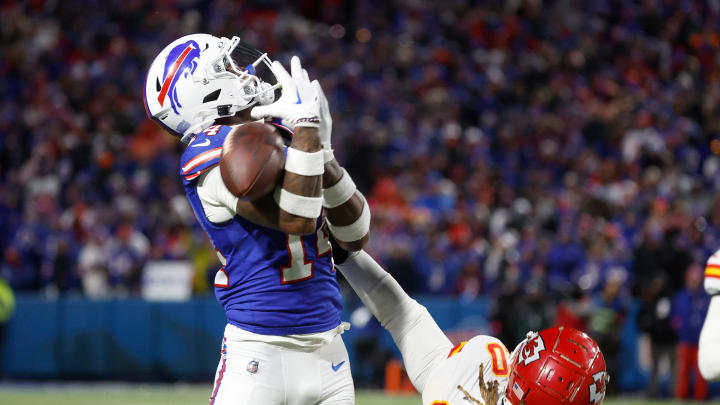NFL writer says Stefon Diggs trade, Chiefs trade down could be 'disastrous' for Bills

There’s an oft-used adage in professional sports that’s nearly as old as organized athletics themselves—control the controllables. Whether you’re an athlete, executive, or owner, you cannot worry about what a competitor is doing to better themselves—you can only focus on, i.e. control, your habits and decisions in your pursuit of self-betterment.
The cliche, in laymen’s terms, tells people to worry about themselves, not their competition.
Bleacher Report’s Alex Kay seemingly disagrees with the sentiment.
In a recent article for the outlet breaking down the 2024 NFL offseason moves “that will look the worst in three years,” the analyst suggested that the Buffalo Bills will soon regret not only their spring decision to trade perennial Pro Bowl wide receiver Stefon Diggs to the Houston Texans, but also their choice to trade down with the Kansas City Chiefs in the first round of the 2024 NFL Draft.
Related: Former Super Bowl MVP, Last-Chance WR among 5 Bills to watch at mandatory minicamp
Kay’s argument stems from the fact that the Bills, despite qualifying for the playoffs in each of the past five seasons, have failed to get over the hump, not once reaching the Super Bowl during their recent stretch of contention. Instead of improving itself in the offseason, Buffalo helped two prominent AFC foes—one ascending and one established—improve, creating what, to Kay, is a double-edged sword for the team.
He wrote the following of Buffalo’s decision to trade Diggs, which he described as a “glaring misstep:”
“For just a 2025 second-rounder in return, the Houston Texans received a top wideout coming off four consecutive Pro Bowl appearances,” Kay wrote. “Buffalo even had to give up a fifth- and sixth-round selections to facilitate the deal. While Diggs did display signs of decline in the back half of 2023 and has struggled in certain playoff games, he still breeched the 1,000-yard receiving mark for the sixth consecutive year.
“Diggs tallied eight touchdowns as well, totaling an impressive 37 scores across the four seasons he spent in western New York. “The 30-year-old will likely add an edge to the Texans' already deep receiving corps and could come back to haunt his former team in the playoffs.”
Misunderstanding the point of the offseason
It would be disingenuous to suggest that Diggs’ absence will not be felt in Western New York; the wide receiver was dominant throughout his four years in Orchard Park, catching 445 passes for 5,372 yards and finishing his stint as the franchise’s fourth-all-time leading receiver. That said, it’s also disingenuous to criticize the team’s decision to trade Diggs without acknowledging why they pulled the trigger; the receiver—which Kay himself notes “did display signs of decline” last season— was set to account for roughly $25 million of the team’s salary cap for the next three seasons. Rather than accounting roughly 10% of its salary cap to a seemingly disgruntled player, Buffalo took its proverbial medicine now, opening up long-term financial flexibility in the process.
It’s true that Diggs will likely go and help a burgeoning Texans team, but the Bills are set to benefit from the financial breathing room his omission affords. This was a move made with the future in mind—unless general manager Brandon Beane simply forgets how to do his job, they’ll hardly regret the decision in “three years,” as the article’s headline suggests.
Kay also took issue with Buffalo’s decision to trade down with the Chiefs on the first night of the 2024 NFL Draft; the Bills moved down from pick No. 28 to No. 32 in the deal, simultaneously improving its standing in other portions of the draft. Kansas City used the selection on Texas wide receiver Xavier Worthy, who broke the 40-yard dash record at the 2024 NFL scouting combine by completing the drill in 4.21 seconds.
Related: Only One Quarterback higher than Bills' Josh Allen in 2024 SI Fantasy Rankings
“Not only did the Bills pass up the opportunity to draft a blue-chip prospect on Day 1, but they also traded down from No. 28 overall with the Kansas City Chiefs and allowed the back-to-back Super Bowl champs to secure Xavier Worthy,” Kay wrote. “While the Bills did get a rookie wideout of their own in Keon Coleman on Day 2, it would hardly be a shock if Worthy—who set the scouting combine record with a blistering 4.21-second 40-yard dash—is one of the top first-year pass-catchers of 2024.
“Worthy's game-breaking speed and playmaking abilities could even be a reason why Kansas City eliminates Buffalo from Super Bowl contention for the fourth time in the last half-decade, an outcome that would cement this as one of the offseason's most disastrous decisions.”
Criticizing the Bills for “pass[ing] up the opportunity to draft a blue-chip prospect on Day 1” seems, for lack of a better term, ridiculous considering they selected Florida State pass-catcher Keon Coleman with the first pick on day two. Coleman was a player several prognosticators had a first-round grade on, and Buffalo seemingly had the same grade attributed to him as it did to Worthy, hence its comfort in trading out of the opportunity to select the Texas pass-catcher—does Coleman suddenly lose ‘blue-chip’ status because he was not selected within the first 32 picks of the draft?
Additionally, criticizing a team for executing a move they felt made it better because it allowed a competitor to add a flashy player is a flawed logic; it goes back to the control the controllables cliche—you cannot prevent yourself from getting better because you’re afraid of what another club may do. Beane spoke about this idea shortly after the conclusion of the 2024 draft:
“You don’t truly know who someone is going to select when you trade with them," Beane said. "They’re not going to call and say, ‘Hey, we’re trading up, and we’re going to take this player.’ And if you don’t trade with them and you pick a different player, they can still trade up with someone else. I’ve never understood that narrative; I’m sure they didn’t just call the Buffalo Bills to trade up, they probably called some other teams, too.”
Kay’s analysis seems alarmist, but he’s not incorrect from a 30,000-foot view—Buffalo, objectively, allowed the Texans and Chiefs to add talented playmakers to their rosters while itself doing little to immediately improve. However, to state that the team will regret these moves in three years—when their entire purpose was to elongate the Bills' championship window and better position them for the future—seems a bit disingenuous.
